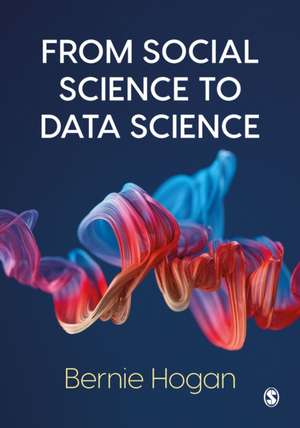From Social Science to Data Science: Key Data Collection and Analysis Skills in Python
Autor Bernie Hoganen Limba Engleză Paperback – 13 ian 2023
With key features such as tables, figures, step-by-step instruction and explanations giving a wider context, Hogan presents a clear and concise analysis on key data collection and skills in Python.
| Toate formatele și edițiile | Preț | Express |
|---|---|---|
| Paperback (1) | 378.56 lei 3-5 săpt. | +33.13 lei 6-12 zile |
| SAGE Publications – 13 ian 2023 | 378.56 lei 3-5 săpt. | +33.13 lei 6-12 zile |
| Hardback (1) | 966.95 lei 6-8 săpt. | |
| SAGE Publications – 13 ian 2023 | 966.95 lei 6-8 săpt. |
Preț: 378.56 lei
Nou
Puncte Express: 568
Preț estimativ în valută:
72.44€ • 75.14$ • 60.40£
72.44€ • 75.14$ • 60.40£
Carte disponibilă
Livrare economică 06-20 martie
Livrare express 19-25 februarie pentru 43.12 lei
Preluare comenzi: 021 569.72.76
Specificații
ISBN-13: 9781529707489
ISBN-10: 152970748X
Pagini: 488
Dimensiuni: 170 x 242 x 25 mm
Greutate: 0.64 kg
Ediția:1
Editura: SAGE Publications
Colecția Sage Publications Ltd
Locul publicării:London, United Kingdom
ISBN-10: 152970748X
Pagini: 488
Dimensiuni: 170 x 242 x 25 mm
Greutate: 0.64 kg
Ediția:1
Editura: SAGE Publications
Colecția Sage Publications Ltd
Locul publicării:London, United Kingdom
Cuprins
Part I: Thinking Pragmatically
Chapter 1. Introduction
Chapter 2. The Series
Chapter 3. The DataFrame
Part II: Accessing and Converting Data
Chapter 4. File Types
Chapter 5. Merging and Grouping Data
Chapter 6. Accessing the Web
Chapter 7. Accessing APIs
Part III. Interpreting Data: Expectations versus Observations
Chapter 8. Research Questions
Chapter 9. Visualising Expectations
Part IV: Social Data Science in Practice: Four Approaches
Chapter 10. Cleaning Data
Chapter 11. Introducing Natural Language Processing
Chapter 12. Introducing Time Series Data
Chapter 13. Introducing Network Analysis
Chapter 14. Introducing Geographic Information Systems
Chapter 15. Conclusion
About the Author
Chapter 1. Introduction
Chapter 2. The Series
Chapter 3. The DataFrame
Part II: Accessing and Converting Data
Chapter 4. File Types
Chapter 5. Merging and Grouping Data
Chapter 6. Accessing the Web
Chapter 7. Accessing APIs
Part III. Interpreting Data: Expectations versus Observations
Chapter 8. Research Questions
Chapter 9. Visualising Expectations
Part IV: Social Data Science in Practice: Four Approaches
Chapter 10. Cleaning Data
Chapter 11. Introducing Natural Language Processing
Chapter 12. Introducing Time Series Data
Chapter 13. Introducing Network Analysis
Chapter 14. Introducing Geographic Information Systems
Chapter 15. Conclusion
About the Author
Notă biografică
Bernie Hogan (he/him/*) is a Senior Research Fellow at the Oxford Internet Institute and the current Director
of the University of Oxford¿s MSc program in Social Data Science. Bernie¿s work specialises in how to
leverage computational tools for creative, challenging, and engaging methodologies to address social science
research questions about identity, sexuality, and community. His favourite work in this area focuses on the
capture and analysis of personal social networks, using both pen-and-paper tools and the recent free opensource
application Network Canvas (https://www.networkcanvas.com). He also has a keen interest in how
language is used to either bring people together or push them apart using large scale quantitative data. He
has published over 40 peer reviewed articles and presented at over a hundred conferences, including several
keynotes. His most famous work reconsidered Goffman¿s offline stage play metaphor of self-presentation for
online life (Hogan, 2010). This piece probably helped in popularising the term ¿algorithmic curation¿.
Before working at the University of Oxford¿s Oxford Internet Institute (https://www.oii.ox.ac.uk) he completed
his undergraduate and graduate degrees in Canada. His undergraduate was in Sociology and Computer
Science at Memorial University in St. John¿s, Newfoundland, Canada. His graduate work was in Sociology
and Knowledge Media Design at the University of Toronto. During that time Bernie interned at Microsoft
Research. Bernie lives in Oxford, UK with his husband and their sprawling vinyl record collection. He tweets
(and collects vinyl) under the moniker ¿blurky¿ because it is a very rare word that sounds like Bernie. Most
of this research is available from his departmental homepage, (https://www.oii.ox.ac.uk/people/hogan) and
or/his GitHub, (https://www.github.com/berniehogan).
of the University of Oxford¿s MSc program in Social Data Science. Bernie¿s work specialises in how to
leverage computational tools for creative, challenging, and engaging methodologies to address social science
research questions about identity, sexuality, and community. His favourite work in this area focuses on the
capture and analysis of personal social networks, using both pen-and-paper tools and the recent free opensource
application Network Canvas (https://www.networkcanvas.com). He also has a keen interest in how
language is used to either bring people together or push them apart using large scale quantitative data. He
has published over 40 peer reviewed articles and presented at over a hundred conferences, including several
keynotes. His most famous work reconsidered Goffman¿s offline stage play metaphor of self-presentation for
online life (Hogan, 2010). This piece probably helped in popularising the term ¿algorithmic curation¿.
Before working at the University of Oxford¿s Oxford Internet Institute (https://www.oii.ox.ac.uk) he completed
his undergraduate and graduate degrees in Canada. His undergraduate was in Sociology and Computer
Science at Memorial University in St. John¿s, Newfoundland, Canada. His graduate work was in Sociology
and Knowledge Media Design at the University of Toronto. During that time Bernie interned at Microsoft
Research. Bernie lives in Oxford, UK with his husband and their sprawling vinyl record collection. He tweets
(and collects vinyl) under the moniker ¿blurky¿ because it is a very rare word that sounds like Bernie. Most
of this research is available from his departmental homepage, (https://www.oii.ox.ac.uk/people/hogan) and
or/his GitHub, (https://www.github.com/berniehogan).
Descriere
Built around the entire research process with a main focus on ethics, this book equips you with scaling up your skills to successfully conduct a computation social science research project with Python.
